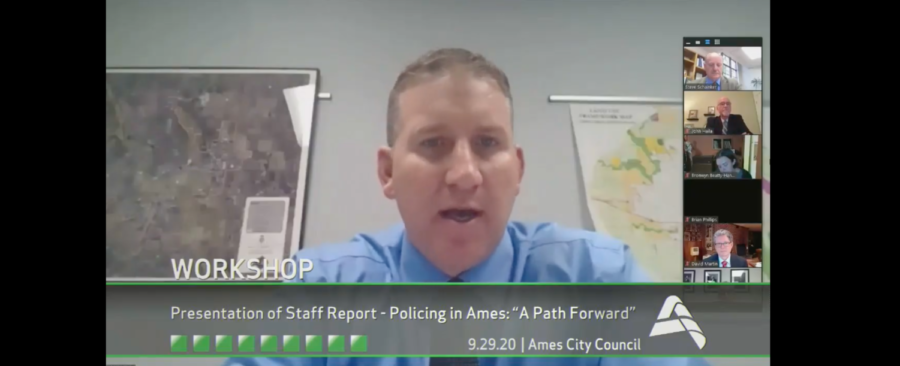Police policy recommendations discussed at special Ames City Council meeting
September 29, 2020
After hearing community input and proposed recommendations to law enforcement policies, members of the Ames City Council stressed continuous improvement in a special meeting Tuesday night.
“It starts with each one of us in the entire community, it’s not just one particular group or organization,” Ames Mayor John Haila said. “It’s not just one particular segment that we really need to work on to help strengthen and address issues to make this a more welcoming place to live and call home.”
The city of Ames received a wealth of feedback, suggestions and demands from the community regarding law enforcement policies and practices following the death of George Floyd.
A 45-page report from Ames City Manager Steve Schainker and city staff — which included 21 different recommendations to local police practices and analysis of community input — was released Friday evening and presented to the Ames City Council Tuesday night.
The report encompasses nine different themes such as: organizational structure, officer recruitment and selection process, officer training, departmental policies, city ordinances and state law, transparency, accountability in complaint handling and discipline, communication and funding.
The themes from the report are derived from the various suggestions, demands and complaints the city received from the Ames community in emails and phone calls.
On the same day of the special meeting, Ames Black Lives Matter (BLM) released its demands for changes to local law enforcement.
“Some will argue we went too far, some will argue we didn’t go far enough,” Schainker said on the community’s feedback before presenting the full report. “But I can tell you, we took all these comments very seriously and tried to balance the comments in our recommendations with the laws that exist today and what we can accomplish in the near future.”
Highlighting what has been suggested by the community regarding each theme, the report details how the city currently approaches each theme and what the city manager is recommending to the City Council.
Influences for the city manager’s recommendations cited in the report include suggestions from community members, police department staff suggestions, peer department activities and services and the President’s Task Force on 21st Century Policing.
Geoff Huff, the interim police chief for the Ames Police Department, was present at the meeting to discuss existing police policies and proposed changes.
“Police officers embrace this document,” Huff said. “I know my staff believes in continuous improvement. They also know they are not perfect, but they strive to be and this is the reason they are supporting this document.”
The city manager wrote in the report that negative interactions with Ames Police Department, “is not the result of a culture of bias embedded in the department.”
The report recommends revised leadership values and recommends a new full-time “inclusion coordinator” position for the city.
Responding to calls for the defunding of the Ames Police Department, the city manager did not recommend any budgetary cuts.
“It’s my professional opinion that any substantial redirection of funding of this budget will have to come from personal services, which will reduce the number of officers and thereby several impact the city’s ability to provide adequate service to the community,” Schainker said.
The Ames Police Department’s budget of $10,596,148 makes up 4 percent of the city of Ames budget, with 88 percent of that budget going to salary and benefits with the remaining $1,297,320 for other expenses.
Several community members providing input at the meeting said if funds were redirected to their desired social services, reduction in employed officers would overall be more beneficial for public safety.
Under the department policies theme, the report lists community requests to ban certain acts of force and enact deescalation methods, such as banning the transportation of detainees in uncomfortable positions and requiring an officer to give verbal warning before using deadly force.
Many existing policies already address these matters, but not all requests are fully abided by existing policies, such as the banning of chokeholds and banning the use of tear gas.
“I want to make it very clear we would not use chemical munitions on any kind of peaceful protest,” Huff said.
Police policy allows the use of tear gas in life or death situations and when the destruction of property is involved.
Community members at the meeting cited other potential consequences involving the use of tear gas, such as when tear gas was deployed at the 2014 Veishea riots and the gas drifted to residence halls affecting sleeping students.
No recommendations to ban or limit any specific method of force was included in the report.
An Ames Citizen Police Advisory Committee (ACPAC) is recommended to be created intended to “incorporate a citizen perspective into the evaluation of citizen complaints against the Ames Police Department.”
Part of the citizen committee’s job would be to make recommendations to the policies and practices of the Ames Police Department and report concerns regarding the handling of complaints against the Ames Police Department to the city manager.
Community member Serena Paulson called for more transparency regarding ACPAC’s potential activities.
“Anything ACPAC receives I think should be made public for the entire community,” Paulson said during the public comment. “It’s important to keep that transparency so we’re not only keeping the police department accountable within ACPAC, but ACPAC is reporting to the entire community. If ACPAC is dealing with this at a community level, then the community should be able to see what they see.”
Ames BLM organizer Ahmed Ismail raised questions at the meeting about how members of the committee would be selected and handled.
“You really need an outside perspective on these issues due to the fact that these issues are affecting marginalized communities,” Ismail said. “There is a huge need to bring in outside communities such as the NAACP or Ames BLM.”
Ismail raised the concern that members of marginalized communities may not have the time to participate in meetings, which take up several hours of time given their work and family commitments.
Current stipulations state that the mayor and City Council will vote on members of ACPAC.
“It’s a huge issue that this ‘something’ going to be appointed by City Council members, this is something that should have community involvement,” Ismail said. “We should allow organizations such as the NAACP, youth shelter services and organizations that do work with the marginalized communities themselves to be the ones who have a say for who is on the committee.”
For the officer selection process, the report lists the existing requirements for hiring eligibility within the Ames Police Department. Acknowledging all individuals have some form of implicit bias, the report’s recommendation states human resources staff will explore additional evaluation tools to detect whether candidates will inappropriately act on implicit bias.
Human resources is also recommended in the report for a more formal training program regarding diversity and bias.
The city manager is also recommending in the next budget cycle to convert a vacant police officer position to an administrative sergeant position to manage departmental training needs, statistical reporting and transparency and supervision of new officers.
The report includes city ordinances recommended by community members, including the banning of racial profiling and prohibiting racial bias in policing. The report recommends the city adopts an ordinance banning any Ames community members from racial profiling. The report also recommends an ordinance prohibiting the filing of false reports to the police or providing false information on the basis of race to the police.
In regards to transparency, the report recommends making quarterly reports on the use of force from Ames Police Department publicly available. The report also recommends creating a system for citizens to report issues of bias, which will be shared with the Human Resources Commission.
A periodic study into the Ames Police Department’s traffic stop statistics is also recommended, in addition to an existing study enacted in 2019 with results to follow this year.
Paid leave for police officers under investigation for misconduct was addressed in the meeting. Under the Peace Officer Bill of Rights and union law, it is not legal to put a police officer on unpaid administrative leave. The police officer must be found guilty of misconduct before being suspended without pay or terminated.
No decisions were set to be made during the evening other than calling a vote to call another meeting to potentially enact some or all of the recommendations. The City Council voted unanimously to move the recommendations to a future agenda.







